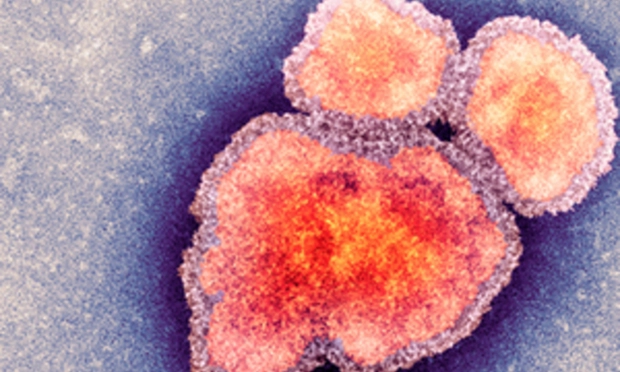‘Heading in the wrong direction’: Alarm over Hackney’s low measles vaccination rate

The measles virus. Photograph: Public Health England
Measles remains a concern in Hackney after more cases of the highly contagious disease were confirmed in other London boroughs.
Hackney continues to have the “lowest” vaccination rate in the country for measles, experts warned during a health scrutiny commission yesterday.
Worryingly, measles cases have seen a “steady rise” in north-west London since April last year, although there have been no confirmed cases in Hackney, consultant in public health Carolyn Sharpe told the commission.
“We have very low vaccination rates, the lowest in the country,” Sharpe said.
An ongoing outbreak in West Midlands is “spreading through schools” and creating “huge amount of work to try and get on top of it”, she warned.
Since October last year, England has seen 465 cases, with 71 per cent of those recorded in West Midlands and 60 cases in predominantly north-west London.
During the week ending 4 February, inner London boroughs recorded 12 measles cases, including one in Haringey, two in Hammersmith and Fulham, two in Newham and four in Westminster, UK Health Security Agency statutory notification of infectious diseases showed.
It is “phenomenal” that Hackney hasn’t had any confirmed cases despite infections in nearby boroughs, the council’s director of partnerships Amy Wilkinson noted.
In City of London and Hackney, 81 per cent of five-year-olds have had their first dose of the MMR vaccine and 56 per cent are fully immunised, figures from 2022/23 show.
Hackney experienced a measles outbreak in 2018/19.
Children tend to catch up with immunisations by the age of five and depending if it is school-driven, Wilkinson explained.
“People don’t realise how serious measles is, which is why we’re maybe seeing a low intake,” Sharpe said.
Hospitalisation rate is between 20-40 per cent for those who are unvaccinated and the “burden of that will fall on children and young people”, she warned.
In some cases, measles can lead to swelling in the brain and be fatal.
Typically, measles starts with cold-like symptoms and a rash only appears later. However, measles is already infectious during the cold phase, which is why it spreads “very easily” during the first few days, Sharpe said.
“It spreads very easily among those who are unvaccinated”, she said.
High-risk settings for an outbreak include nurseries, schools, homeless and asylum seeker accommodation.
At particular risk from measles are babies under the age of one, who are too young for immunisation, and pregnant women, for whom a measles infection can cause complications and even miscarriage.
“We’ve been monitoring measles for quite a while. We know our vaccination rates are heading in the wrong direction and there are a lot of countries abroad where measles is endemic, so the risk of travel associated infection and an outbreak stemming from that was always high,” Sharpe explained.
Several factors contribute to a lower immunisation cover in an urban area like Hackney, Sharpe said.
“The evidence shows that inner city more urban, more deprived populations have lower coverages and that’s why London as a region has lower coverage of the whole of the country. The more urban have even lower, and the more culturally and ethnically diverse populations have even lower coverage. We know populations that are socially and economically deprived also find it hard to get vaccinations for multiple reasons,” she added.
“A lot of this is access. If you have a family or if you’re a single parent and you have a couple of jobs it’s just very difficult to get to an appointment, and sometimes it’s those convenience factors that are playing a role rather than a belief that vaccines don’t work or being hesitant.”
In Hackney, the Gypsy, Roma and Traveller, Black Caribbean, Black African and Black British, and Orthodox Jewish populations tend to have lower vaccination coverage, Sharpe continued.
The council is using a targeted strategy to address access and convenience issues, including language barriers, and by working with community and faith groups.
The council is now campaigning to target children who have had no vaccine doses and those who are not registered with a GP.
Even one dose of the MMR vaccine can offer around 90 per cent protection, Wilkinson said.
